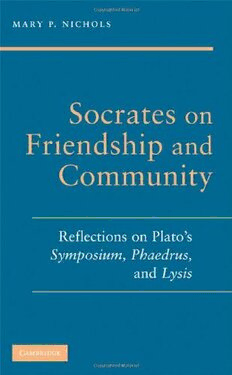
Socrates on friendship and community: reflections on Plato's Symposium, Phaedrus, and Lysis PDF
238 Pages·2009·1.156 MB·English
Most books are stored in the elastic cloud where traffic is expensive. For this reason, we have a limit on daily download.
Preview Socrates on friendship and community: reflections on Plato's Symposium, Phaedrus, and Lysis
Description:
In the modern philosophical tradition, Plato's Socrates has been viewed as an alienating influence on Western thought and life. In this book, Mary Nichols addresses Kierkegaard's and Nietzsche's criticism of Socrates and recovers the place of friendship and community in Socratic philosophizing. Her rich analysis of both dramatic details and philosophic themes in Plato's Symposium, Phaedras, and Lysis shows how love finds its fulfillment in the reciprocal relation of friends. Nichols shows how friends experience another as their own and themselves as belonging to another. Their experience, she argues, both sheds light on the nature of philosophy and serves as a standard for a political life that does justice to human freedom and community.
See more
The list of books you might like
Most books are stored in the elastic cloud where traffic is expensive. For this reason, we have a limit on daily download.
